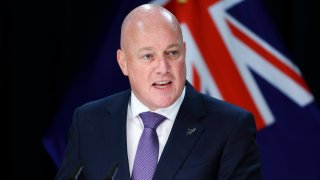
New Zealand’s new prime minister plans to ban cellphone use in schools and repeal tobacco controls in the ambitious agenda he released Wednesday for his first 100 days in office.
Christopher Luxon outlined 49 actions he said his conservative government intended to take over the next three months.
The first new law he planned to pass would narrow the central bank's mandate to focus purely on keeping inflation in check, he said. That would change the Reserve Bank's current dual focus on low inflation and high employment.
Many of the actions in the 100-day plan involve repealing initiatives from the previous liberal government, which had been in office for six years. The new efforts include a plan to double renewable energy production.
Get top local stories in Philly delivered to you every morning. >Sign up for NBC Philadelphia's News Headlines newsletter.
Luxon said many of the measures were aimed at improving the economy.
Many of the plans are proving contentious, including the one to repeal tobacco restrictions approved last year by the previous government. Those included requirements for low nicotine levels in cigarettes, fewer retailers and a lifetime ban for youth.
Luxon's government has said that ending the tobacco restrictions — which were not due to take effect until next year — would bring in more tax dollars, although Luxon said Wednesday it wasn't a case of trading health for money.
U.S. & World
Stories that affect your life across the U.S. and around the world.
“We are sticking with the status quo,” Luxon said. “We are going to continue to drive smoking rates down across New Zealand under our government.”
Critics say the plan is a setback for public health and a win for the tobacco industry.
Two education initiatives — one requiring schools to teach an hour of reading, writing and math each day, and another banning cellphone use — reflect a sentiment among some voters that schools have strayed from their primary mission.
Others plans around ethnicity, such as disbanding the Māori Health Authority, have been portrayed by Luxon's government as measures to treat all citizens equally but have been attacked by critics as being racist against Indigenous people.



